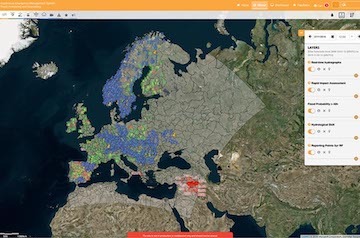
by CEMS-Flood Analytics and Dissemination Centre (DISS)
All EFAS partners can request a training on the EFAS service and products to better make use of the available information. During autumn 2022, the CEMS-Flood Analytics and Dissemination Centre (DISS) held two full-day trainings for the EFAS partners in Georgia and Denmark. In total, about 60 participants from the different partners and associated organisations received an introduction to the various products and services accessible in the EFAS information system (EFAS-IS), making this year’s autumn season quite efficient in terms of user engagement and support.
On 12 October, representatives from DISS and from the Meteorological Data Collection Centre (MDCC) conducted a training for participants from the Georgian EFAS partner, the National Environmental Agency (NEA), who were accompanied by colleagues from IHE Delft visiting NEA as well as participants from the Caucasus Environmental Knowledge Portal (CENN). The training was held in a hybrid format with Assoc. Prof. Ilias Pechlivanidis from DISS being present at NEA and all other lecturers joining online. This setup worked exceptional well thanks to a very professional preparation on the technical side at NEA.
The training focused on:
- Introduction to the EFAS service and existing products, including a presentation on the new products and the 6-hourly calibration;
- Hands-on training on how to use the EFAS-IS and extract hydro-meteorological information for forecasted extreme events;
- Demonstration on how to provide feedback for received flood notifications.
Moreover, NEA presented the various ongoing nationally and internationally funded projects that aim to develop the hydrological forecast and warning service in Georgia. The introduction sparked a discussion regarding data-sharing between EFAS and NEA in both directions, hydrological and meteorological in-situ data from NEA and gridded weather data from MDCC.
All Georgian participants were very active during the whole day of training and there were many fruitful discussions that will further improve future trainings and the service as a whole.
The second EFAS partner training was held on 22nd November for the recently joined Danish EFAS partner, the Danish Meteorological Institute (DMI). This training differed somewhat from the usual setup, because the target audience included the meteorological forecasters at DMI, who received the training in the first place. Nevertheless, the hydrological unit at DMI, which still is in a start-up phase, joined the training as well.
In general, the topics covered followed the same structure as in the training for the Georgian partner; however, the presentation setup was adjusted to be efficiently communicated to the meteorologists (e.g. less in-depth presentation of the hydrological model used, and rather more focus on hands-on instructions how to interpret the products and flood notifications). Furthermore, the group of DMI meteorologists had to be subdivided into two groups (group 1 and 2) following their duty schedule. In order to provide training to all forecasters, the in-person training during the first day was recorded and presented to the group 2 officers on 5th December 2022. On that day, DISS was available to answer questions. Even if technical aspects could be improved for similar situations in the future, this way of conducting the training still proved efficient.
An EFAS partner who wishes to receive a training can get in touch with the CEMS-Flood Analytics and Dissemination Centre, either by using the contact form on the EFAS homepage or by sending an email to info@efas.eu. Note that partners who have not received a training before are being prioritised.

